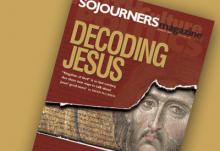Community Organizing
What lessons do we take away from the Jena 6 story? Six young men won't be dragging a felony conviction into adult life. That's reason for rejoicing, but as this saga approaches its third birthday, it's fair to ask if we have learned anything.

How I learned the real meaning of strength -- from the unlikeliest of people.

I grew up in Bakersfield, California, where my father was a rabbi and my mother was a teacher. I went to Harvard in 1960, in part because it was about as far as I could get from Bakersfield, which was the terminus of the dust bowl migration that John Steinbeck made famous in The Grapes of Wrath.
I got my real education, however, when I left Harvard to work in the civil rights movement in Mississippi. I went to Mississippi because, among other things, my father had served as an Army chaplain in Germany right after World War II. His work was with Holocaust survivors, and as a child the Holocaust became a reality in our home. The Holocaust was interpreted to me as a consequence of racism, that racism is an evil, that racism kills. I made a choice to go to Mississippi.
I also was raised on years of Passover Seders. There’s a part in the Passover Seder when they point to the kids and say, “You were a slave in Egypt.” I finally realized the point was to recognize that we were all slaves in Egypt and in our time that same struggle from slavery to freedom is always going on, that you have to choose where you stand in that. The civil rights movement was clearly about that struggle. It was in Mississippi that I learned to be an organizer and about movement-building.
I went to Mississippi because it was a movement of young people, and there’s something very particular about young people, not just that they have time. Walter Brueggemann writes in The Prophetic Imagination about the two elements of prophetic vision. One is criticality, recognition of the world’s pain. Second is hope, recognition of the world’s possibilities. Young people come of age with a critical eye and a hopeful heart. It’s that combination of critical eye and hopeful heart that brings change. That’s one reason why so many young people were and are involved in movements for social change.
Wednesday morning I got an e-mail from a former member of our Sojourners community. Perry Perkins is now a community organizer in Louisiana with affiliates of the Industrial Areas Foundation (IAF). "Perk," as we used to call him, reported on the enormous consequences of 2 million people being evacuated because of Hurricane Gustav, much of the state now being without power, how hard cities like Baton Rouge were hit, the tens of thousands of people in shelters and churches, and the [...]

Nane Alejandrez had plenty of opportunities to die. Instead he chose life, and brought generations of Latino youngsters with him.
In addition to providing services to the elderly, We Are Family helps volunteers tap in to the history of African-American communities in Washington, D.C. Through casual visits as well as oral history projects, volunteers sometimes are able to uncover accounts of major events in U.S. history.
We Are Family volunteers have given Belva Simmons, 78, who lives in D.C.’s North Capitol neighborhood, a chance to tell the story of her career as a congressional staff person and her role in passing the Civil Rights Act of 1964.
Catholic Kenyan environmental activist Wangari Maathai won the 2004 Nobel Peace Prize—a first for an African woman and a first for environmentalism

